Mother and child under brutal attack called 911. Why did Kansas City police walk away?
For two weeks, the little girl did not wake up. Three more passed until she spoke.
Before she was rushed to the hospital on Jan. 15, 2022, 4-year-old Bella Hopkins spent several hours bleeding, critically hurt, on her bed. To family who saw her taken into the emergency room, it looked like her small head had been stomped on.
Her mother, Mackenzie Hopkins, 24, was found dead that night, submerged in the bathtub. She had been beaten severely, and bloody boot prints marked the floors of her newly rented Kansas City home.
In the 15 months since then, the Hopkins family has come to learn many of the haunting details behind the brutal attack. But, many questions linger — including ones that, for Shannon Hopkins, bring a mix of anger and sadness.
Why did two Kansas City police officers who responded to Mackenzie Hopkins’ home on a 911 call stop at her door and leave without going inside?
Was it after police left, and the alleged killer returned to the house, that he brutally attacked Bella?
Could the officers who first responded have saved the mother’s life and prevented the child from being injured?
Twelve hours before the mother and daughter were found, a 911 call from Mackenzie Hopkins’ cellphone brought the police to the house. But they left, giving the alleged killer, 31-year-old Jose Escalante-Corchado, the freedom to go back inside — an act authorities say was captured on surveillance video.
The Hopkins family says detectives told them the officers who responded to the 911 call could not enter the house because of a policy that came after the conviction of Eric DeValkenaere, a white Kansas City police detective found guilty of involuntary manslaughter in the fatal shooting of a Black man.
Police officials have publicly denied that any changes in practice or policy were made in response to the DeValkenaere case, in which the former officer was faulted for going onto private property without probable cause.
But they have not offered another explanation for the officers’ failure to find Mackenzie and Bella Hopkins until 12 hours after the 911 call was made.
Officer Donna Drake, a Kansas City Police Department spokeswoman, declined to answer The Star’s questions concerning the actions of officers that day, saying the department could not discuss the case as it has been referred to Jackson County prosecutors.
Outside of probable cause statements filed in Jackson County court, Drake said the only publicly available record is an incident report generated after Mackenzie Hopkins was found dead and the homicide investigation was opened. The one-page document contains a two-sentence narrative, and makes no mention of the discovery of the injured child.
Many other records, including the final autopsy report and the recording of the 911 call made on the morning of her death, remain closed under state law.
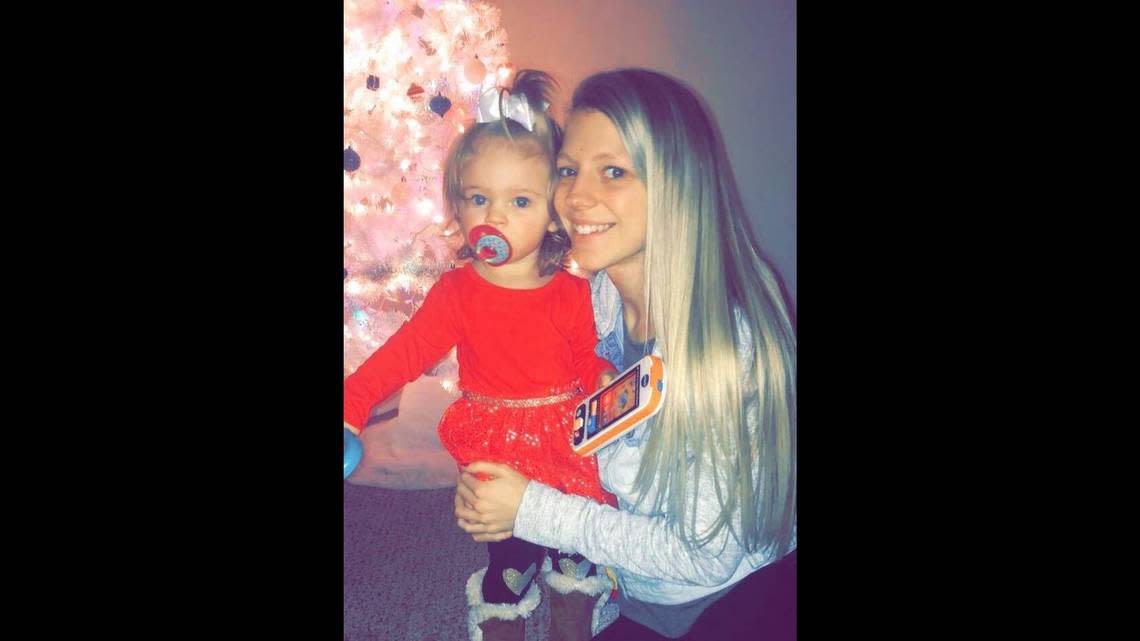
Meanwhile, the strongest defense of the two officers has come from Jackson County Prosecutor Jean Peters Baker, who told The Star she did not believe they made mistakes when they left Mackenzie Hopkins’ home. While she declined to discuss details of the criminal case, Baker said the officers did not appear to depart from normal police procedure in the actions they took that morning.
Still, Baker called it “cruel” that the Hopkins family was given “bad information” that has further caused the family pain. She said nothing has changed about the law or KCPD policies and training since DeValkenaere was convicted.
For his part, Shannon Hopkins is thankful that Bella, his granddaughter, is still with him. She is a “happy-go-lucky” 5-year-old.
Still, she carries a physical reminder of the attack she survived: a large scar across her forehead where surgeons replaced a piece of her skull.
The family wonders what trials she will face without Mackenzie Hopkins — fondly remembered as “Mickey” — to be there as the dedicated and loving single mother she was.
“She talks about her mom, but never in a sad way,” Shannon Hopkins said of his granddaughter. “Thankfully, I don’t think she has a memory, or at least going to the counseling she went through afterwards, and just in conversations with her grandmother and I, and other family members. She really doesn’t have a recollection of the incident.”
For the Hopkins family, the grief of losing Mackenzie Hopkins to a sudden act of violence is still compounded by what-ifs. They have never heard a convincing explanation for what police officers did that day after the 911 call and why. And those are answers Shannon Hopkins believes his family deserves to have.
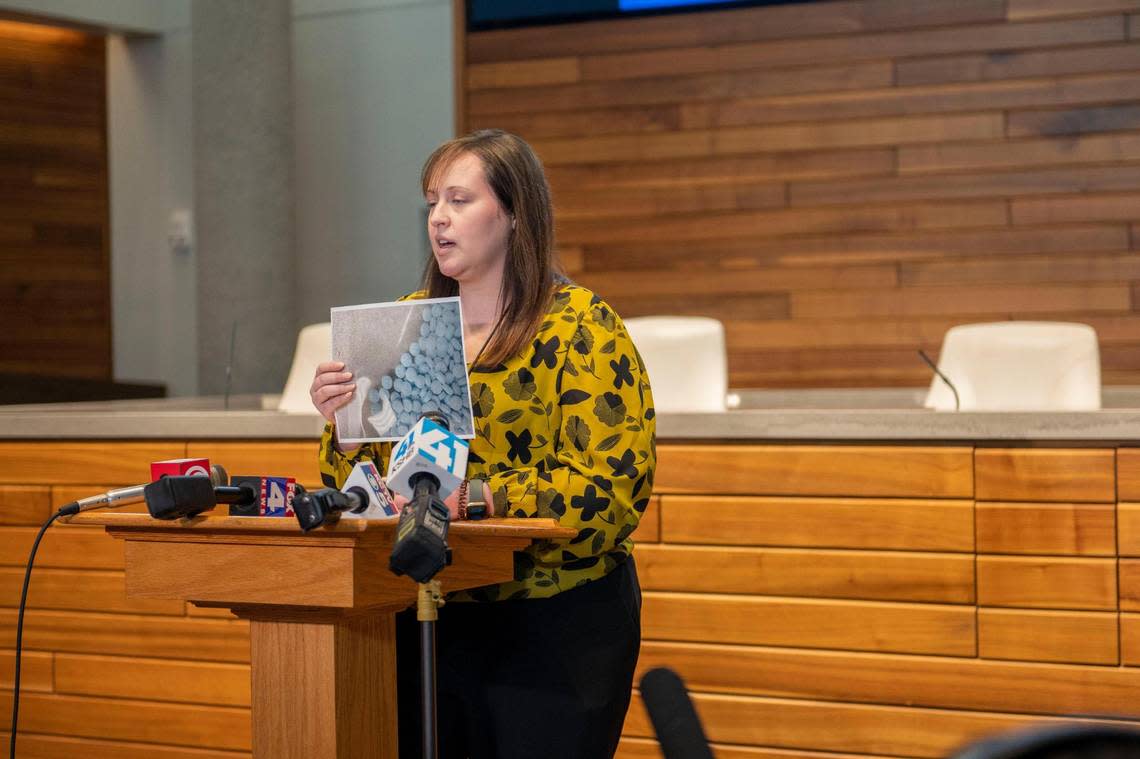
“From what I’ve been told, they stood less than three physical feet from my daughter, my dying daughter, or my dead daughter,” he said.
He wonders, too, what conversations were had outside her door when the officers decided to leave.
“We’ll never know what that was. But I think that it needs to happen. We need to know,” he added.
“It certainly would have helped me to know why those two people didn’t go in to save my daughter who called them to come.”
The police department declined to make Kansas City Police Chief Stacey Graves available for an interview to discuss the case.
The five members of the Kansas City Board of Police Commissioners, including Mayor Quinton Lucas and four members appointed by Missouri Gov. Mike Parson, did not respond to The Star’s request for comment.
Kansas City Council members Ryana Parks-Shaw and Lee Barnes Jr.., who represent the district where the crime occurred, also did not respond to The Star’s request for comment.
A 911 call and a struggle
Surveillance cameras near Hopkins’ house in the 7300 block of Wabash Avenue showed a white pickup truck with a Kansas license plate pass by her house at 5 a.m.
Forty-six minutes later a man with dark-colored clothes, alleged to be Escalante-Corchado, who was romantically involved with her friend, walks up to Hopkins’ home and disappears from view into the back yard.
Fifteen minutes later, at 6:01 a.m., the 911 call was placed from Mackenzie Hopkins’ cellphone. On other end of the line, a call taker could hear the sound of a disturbance and people fighting. The Hopkins family was later told there were sounds of a struggle, and that whoever dialed 911 — presumably Mackenzie Hopkins — did not terminate the call.
One minute after that phone call, the alleged killer is seen on surveillance cameras running from the residence. He heads south on Wabash and east on 74th Street.
Police have never outlined the precise actions of the officers who responded to the call that morning, including what time they arrived, how much time was spent there, and what they did. The only confirmation that two police officers did so much as stop at the house and knock on the door has come from the Hopkins family and the Jackson County Prosecutor’s Office.
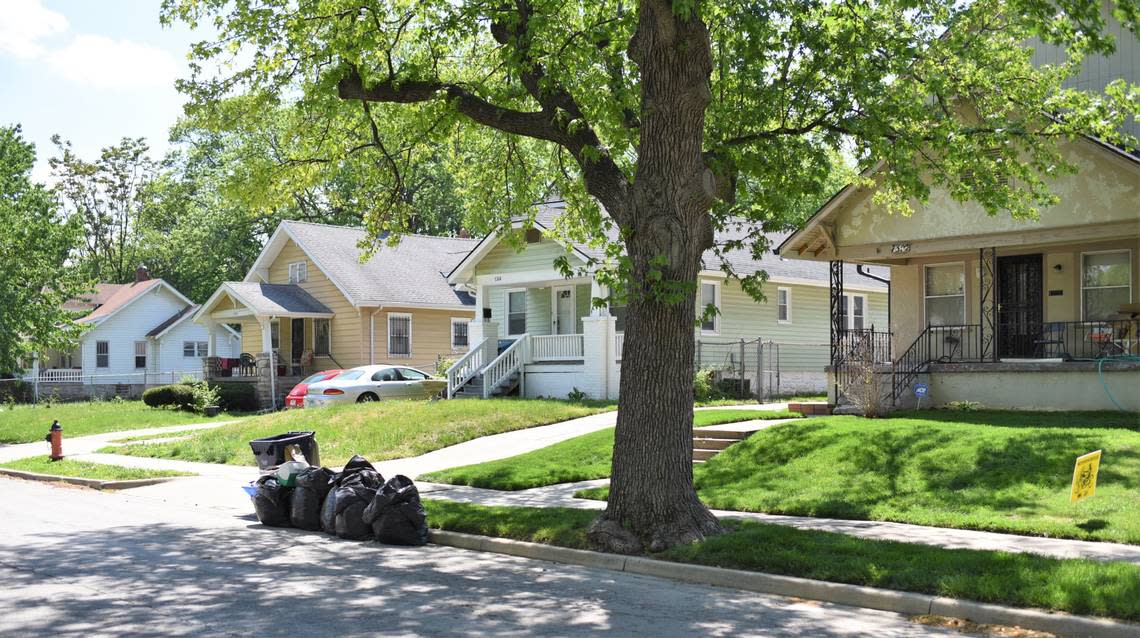
During that window, Escalante-Corchado — wearing a blue COVID-19 mask over his face — parked the white truck he was driving outside of a gas station convenience store at 70th and Prospect and walked inside.
At 6:27 a.m., his white truck was seen following two police cars that were traveling north on Prospect past Gregory Boulevard — heading in the opposite direction of Mackenzie Hopkins’ home.
At 6:48 a.m., Escalante-Corchado allegedly ran back toward the house and went around the back, according to court documents. He walked out two hours later and headed south on Wabash.
Over the time Escalante-Corchado allegedly spent in the house that day, he is accused of beating Mackenzie Hopkins with “aid of a dangerous instrument.” Drag marks were observed by Kansas City police crime scene investigators, and within pools of blood were sole prints stamped with the word “Ariat,” a cowboy boot brand.
He allegedly attempted to murder 4-year-old Bella — who Shannon Hopkins says may have been able to recognize him because she played with his daughter, who is around the same age.
Plans had been made with Mackenzie and Bella Hopkins that day to be with family. Mackenzie Hopkins often stayed up late — on the last night she spoke to friends and family she was watching movies with her daughter.
So, there was not a great concern when she did not answer the phone that morning.
But by the afternoon, worry started to grow. Shannon Hopkins and his youngest daughter, Hazel, decided to make the 20-mile drive from their Shawnee townhome to check on them.
As they were driving, Shannon Hopkins was overcome with the fear that something horrible had happened. He thought perhaps there had been a gas leak in the house.
Whatever the case, he did not want to open that door alone. He called the police.
That evening, at 5:49 p.m., a second set of officers was dispatched to Mackenzie Hopkins’ house. After arriving there, a detective wrote in court documents, the officers noticed what appeared to be blood leading up to the front steps. The officers were on the block when family arrived.
Officers asked Shannon Hopkins if he could open the door. He walked up the staircase, the key in hand, and pushed. Already unlocked, it opened.
It was nighttime by then, and the house was dark. He took a step inside to flip a light switch. That’s when the flashlights of police illuminated the blood-covered floor. His younger daughter, still standing behind the screen door, screamed.
The officers drew firearms, pulled Shannon Hopkins out, and went in.
“I thank God every day that I called the police,” Shannon Hopkins said. “Because I can’t imagine having walked farther into the house and finding Mickey in that state, and Bella. So, I was thankful for that small, small grace.”
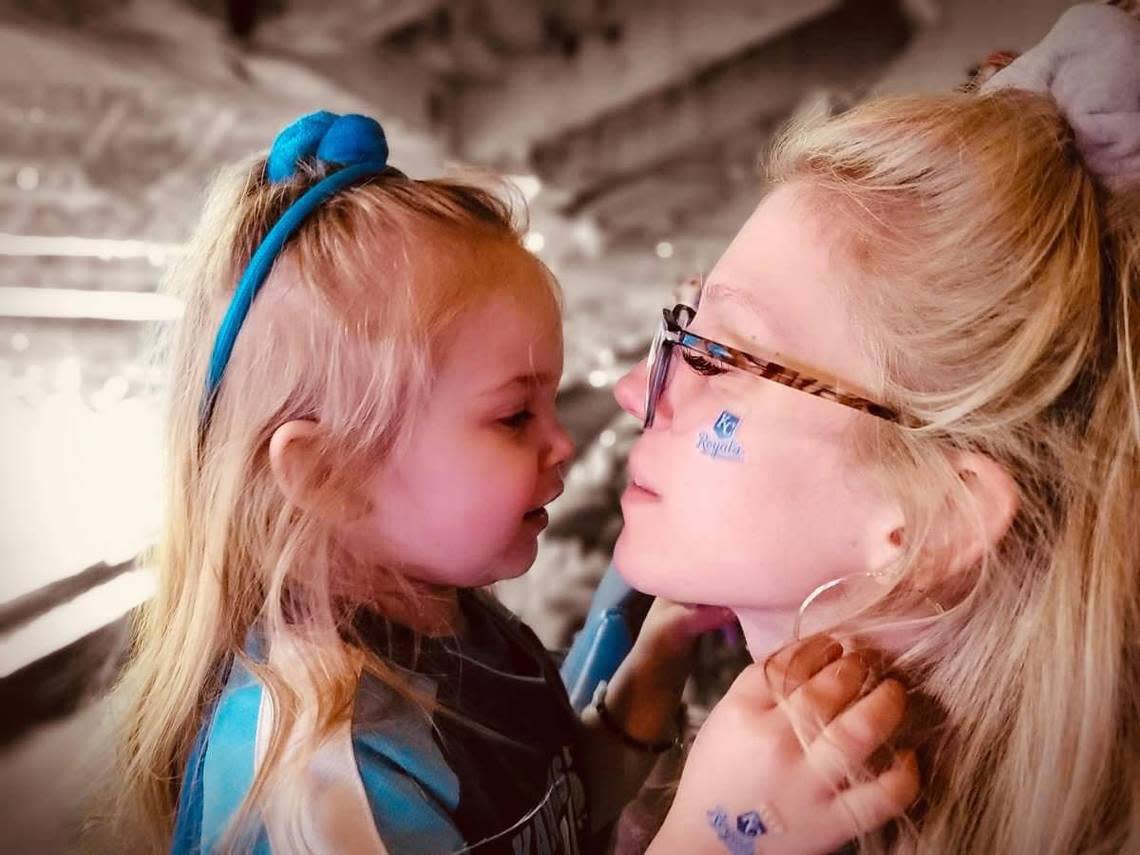
On Jan. 16, 2022, the day after that door was opened, police arrested Escalante-Corchado after serving a search warrant at his Kansas City, Kansas, home. They were led to him as a suspect after Escalante-Corchado’s girlfriend told detectives she had used her friend Mackenzie Hopkins as an alibi the night before she was killed, and that he had been out all night long.
As the family continued to hope and pray that young Bella Hopkins would survive, they were met by police detectives and told the man responsible had been caught.
Shannon Hopkins was impressed by the quick work of Kansas City police to solve the case. But then the family learned about the early-morning 911 call.
At first, he said, he believed the detectives had misspoken, and they were referring to the call he made 12 hours later that evening asking police to come meet him at his daughter’s home. Then, his daughter-in-law asked: “So, she called 911?”
“And they said, ‘Yes,’” Shannon Hopkins recalled. “And that’s when it occurred to me that they weren’t talking about my call.”
The family was “alarmed” and “extremely upset,” Shannon Hopkins said. They wanted to know why Mackenzie Hopkins did not get help that morning. And they heard a puzzling explanation that never sat right.
The DeValkenaere explanation
Detectives told the Hopkins family about the DeValkenaere case, saying his conviction in the killing of 26-year-old Cameron Lamb in Kansas City months earlier had imposed new restrictions on what police officers could do in emergency situations.
“They told us at that time it was a ‘policy change,’” Shannon Hopkins said. “We were told later by the D.A. that there was no policy change.”
Family members were not the only ones who heard a similar explanation from police.
Sarah Erikson, a friend of Mackenzie Hopkins, said she too called a homicide detective seeking answers for her and on behalf of other concerned friends. During a brief call, Erikson told The Star, she raised the subject of the 911 call.
The detective, she said, explained in an “irritated but airy” tone how a fellow officer “just got his entire life ruined because he went in the back of somebody’s yard and shot the (homeowner),” and said the police “can’t help anybody anymore.”
“And I was just like, ‘Are you kidding me?’” Erikson said. “I was so baffled by how angry he was. I mean, he was blaming the law on their inaction. And I just thought that was the biggest excuse I’ve ever heard in my life.”
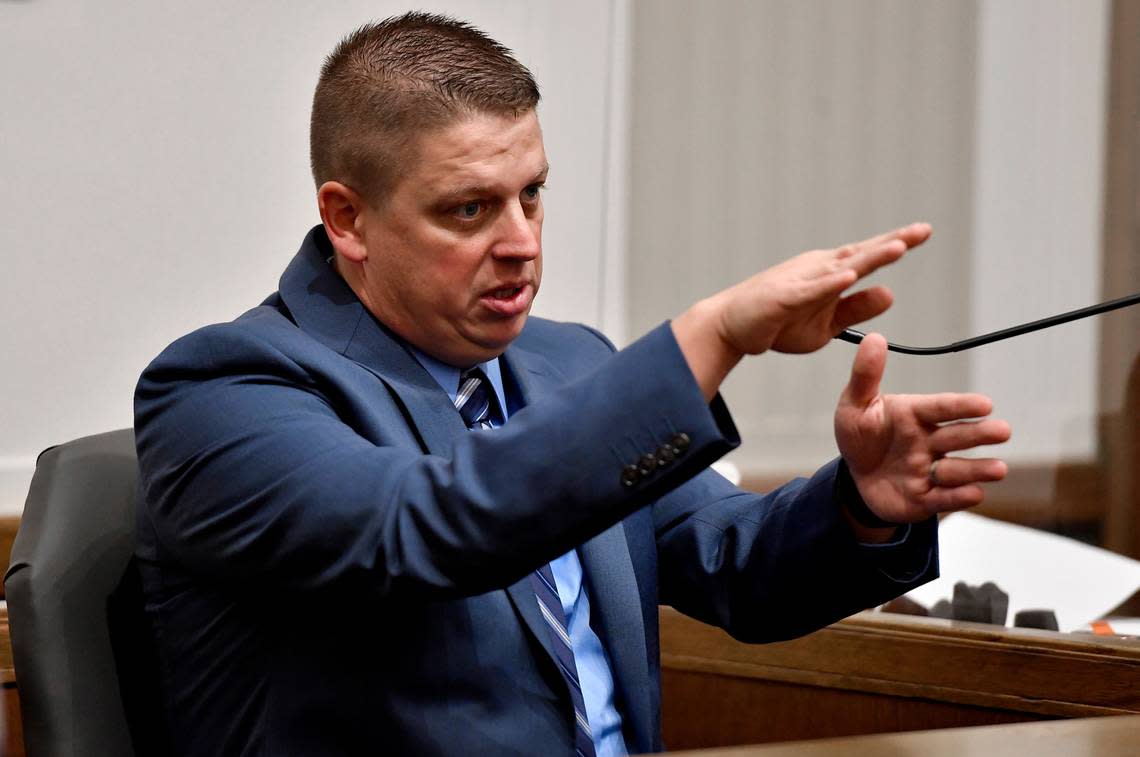
In 2020, DeValkenaere, a plainclothes detective with the Violent Offenders Squad, responded to a police helicopter’s report of a traffic incident. With his partner, DeValkenaere ran into the backyard where Lamb was backing his pickup truck into the garage at his home near 41st Street and College Boulevard.
Within seconds of arriving, DeValkenaere shot and killed him.
DeValkenaere maintained he shot Lamb in defense of his partner after seeing Lamb with a gun. Jackson County prosecutors charged him criminally, saying at trial that Lamb was unarmed and the gun had been planted along with other evidence.
DeValkenaere was convicted in November 2022 following a bench trial overseen by Jackson County Judge Dale Youngs. He was found guilty of involuntary manslaughter and armed criminal action, and sentenced to six years in prison.
In finding him guilty, Youngs relied in part on protections outlined under the U.S. Constitution’s Fourth Amendment, which protects citizens from unlawful searches and seizures. Youngs found DeValkenaere and his partner did not have probable cause to be on Lamb’s property when he was shot and killed.
Fifteen months ago, when news reports, including The Star’s, first surfaced calling into question whether the DeValkenaere verdict had resulted in any changes in police procedure or policy, the official word from the Kansas City Police Department was that no changes had been made.
But in another case, which originated in the Metro Patrol, the same station that polices the neighborhood where Mackenzie Hopkins lived, the so-called DeValkenaere policy was referenced by a police captain in a voicemail left for a resident who publicly complained on social media that police officers had failed to investigate a break-in at his neighbor’s residence.
In the voicemail, a copy of which was obtained by The Star, the captain referenced a policy named for DeValkenaere specifically that he did not “agree with” but was “something you citizens need to know.” He said officers were limited in how thoroughly they could investigate crimes to the extent that — absent a search warrant — they could only go inside a residence in extreme circumstances, such as “someone screaming for help inside.”
Prosecutor Baker has publicly taken issue with that statement, saying the police captain “profoundly misstates the law.”
During a recent interview with The Star, Baker said she does not understand why that information would be disseminated. She has likewise been left to opine what would have motivated police to tell the Hopkins family that convicting a police detective had some impact on their ability to respond to an emergency.
“It makes you wonder if there’s a willful ignorance happening here for some kind of a political view of the Fourth Amendment,” Baker said. “I don’t know. That’s where I’m stuck opining, because this is not difficult. KCPD’s policies have not changed. KCPD’s trainings have not changed.”
She takes issue with the incorrect interpretation that the DeValkenaere verdict had any effect on the law, and the fact that a crime victim’s family was given “bad information” that has caused further suffering.
“Mr. DeValkenaere was convicted in a court of law with rules of evidence, and one of the ways he was convicted was based on KCPD’s policies and trainings on the Fourth Amendment,” Baker said. “Those things haven’t changed. Not before DeValkenaere was convicted, and not after he was convicted.”
“So, that’s where there appears to be just this willful ignorance of the law,” she added. “And when it touches on victims, victims receiving bad information on that, that I want to speak out about. Because it’s cruel. It’s cruel. And I want people to kind of get their heads on straight here. We’ve got serious work to do. Solving homicides and successfully trying those homicides before a court of law.”
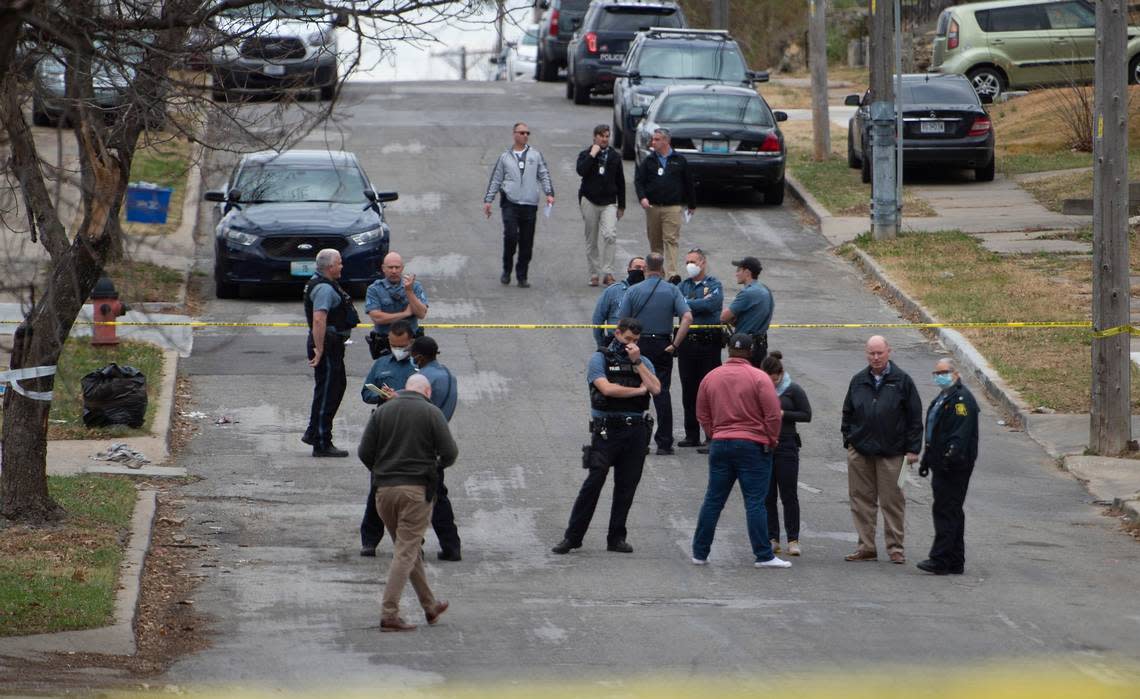
Lauren Bonds, a civil rights attorney and executive director of the National Police Accountability Project based in Kansas City, Kansas, said there isn’t “any basis” for the idea that the DeValkenaere verdict mandated a policy change because of a shift in the law. But she said decisions may have been made to limit liability of police officers in response.
She also thought a department-wide change resulting from a very specific set of facts in the DeValkneaere case — something that differed greatly from the Hopkins situation — would be “odd.”
It would be unusual to “do a wholesale blanket requirement that police respond more slowly or don’t engage in situations that are so factually different from the case where this verdict was issued,” Bonds said.
Meanwhile, Bonds agreed with the assessment made by Baker last year that some police officers may have reacted emotionally to the DeValkenaere verdict. She spoke of trends seen in Minneapolis, for example, after the killing of George Floyd, where a wave of police officers began collecting disability.
“We hear a lot from police advocates who are opposing accountability bills: ‘Police officers are going to be too afraid to do their job if you enact (legislation) where we can be held civilly liable or criminally liable in these situations.’”
That’s a threat that we’ve heard across the country,” Bonds said.
In the case of the Mackenzie Hopkins 911 call, Bonds said there are “very few legal requirements” for how police actively respond to an emergency and little to hold them accountable for failing to act.
Generally, she said, they are not liable unless they create a danger that causes injury or a person is harmed by their actions or negligence after being taken into custody.
“So if they show up and say, ‘This isn’t a situation where I feel like we can do anything’ … or something that’s just kind of like a non-response once they show up, that’s usually not going to be a situation where there’s legal liability.”
A mom, a nurse, a woman with drive
The middle of three children, Mackenzie Hopkins grew up around Wichita before moving with her family to suburban Kansas City for her senior year of high school.
She hated the local school system and got her GED that summer before going on to college for her associate’s degree.
Shannon Hopkins acknowledges most parents have a “lavender screen” when it comes to their own children. But he can say of his that they’re all “good kids.”

“I was a bad kid. I was always in trouble when I was a teenager. I just never got paid back, I guess. Which is always what you expect as a parent that you’re gonna reap what you sow,” he said with a chuckle. “But my kids are just salt of the earth. I just don’t know how else to put it.”
They did not always see eye to eye on everything. Dinner table conversations with his daughter would sometimes gravitate toward policing in the U.S. He thought the cops got a bad rap in many cases — she often disagreed.
“We didn’t agree on most politics,” Shannon Hopkins said. “And that certainly was something that we battled over more than once.
“I’ve had a struggle with that mindset, I guess, over the last year because it has been slammed down in front of this family that quite possibly some of the things that I believed were not true. And certainly didn’t play out that early morning.
The fact that I spent so many years defending a group of people that, when we truly needed them, let us down, is a source of guilt that I carry with me now.”
Outside of her home life, Mackenzie Hopkins made fast friends where she went, those close to her told The Star. She cared deeply for others — a trait that extended to her chosen profession.
She was already working as a certified nursing assistant in North Kansas City Hospital, and was taking college courses to become a registered nurse.

In adulthood, she and the father of her daughter, Hector, split up but remained close. She spent about a year living at home with her parents when she decided to find a place for her and Bella Hopkins to call their own.
Erikson, who considered Mackenzie Hopkins her best friend, knew her as Kenzie. They first met around the fall of 2019 while they were both working at the Hy-Vee in Raytown. Both took interest in the medical field.
An average outing, where Bella Hopkins would often tag along, was a walk around the River Market or the Parkville Nature Sanctuary. Mackenzie Hopkins loved to be outdoors. She and Erikson had talked about taking out-of-state trips to Colorado and Texas.
“She just was always so motivated to not only be a better person, but be a better mom, to be a better worker. She was always chasing being able to elevate and make more money so she could give Bella anything that she needed or desired,” Erikson said.
“I just can’t emphasize enough how much drive she had, while taking care of a toddler,” she added. “I mean, she was just always going, going, going. Working on being better.”
Two weeks before she was killed, Shannon Hopkins helped move his daughter into the new house at 73rd and Wabash. It was there, he said, that he briefly met Escalante-Corchado. They never spoke, but Shannon Hopkins said he was there to help her move her things in, too.
His daughter was close with Escalante-Corchado’s girlfriend, he said — so much so that she had a key. And on Jan. 14, the night before Mackenzie Hopkins died, the girlfriend told Escalante-Corchado she was going out to see Mackenzie Hopkins — something she later told police was a fake alibi.
From what Shannon Hopkins has gathered from authorities since, the morning that Escalante-Corchado came to his daughter’s house he was looking for his girlfriend “and obviously didn’t find her there.”
“And then my daughter and granddaughter took the brunt of his anger,” he said.
Jackson County prosecutors charged Escalante-Corchado with first-degree murder. He is also charged with first-degree assault, accused of attempting to kill Bella Hopkins.
The 31-year-old has pleaded not guilty to the charges. Among the legal filings in the case was one where his defense attorney contended Esclante-Corchado’s mental fitness was in question, saying he hears voices that aren’t real and suffers from periodic blackouts.
His attorney did not reply to The Star’s request for comment for this story. His trial is scheduled to begin in October.
Miracle of the family
After she was rescued from her home in critical condition, Bella Hopkins was rushed into surgery.
She spent weeks in the intensive care unit before she was cleared to leave the hospital in February 2022.
Her recovery earned her a title as the miracle of the family. Videos, captured by family and friends, documented the progress she made — from stumbling as she tried to walk again, to running through the house with her nasal feeding tube trailing behind her, paying no mind to the helmet on her head.
Along with physical and occupational therapy, she continues to go through counseling. The family does too.
Over Easter weekend, they gathered in memory of what would have been Mackenzie Hopkins’ 26th birthday. Shannon Hopkins said part of that included talking about how they deal with the pain and, sometimes, guilt that comes whenever they are reminded of what happened to them.
For Bella, they realize many of these feelings won’t strike until she is older. And they want her to be prepared for that.
“I think now, because she’s a child, she sees things in childlike ways. So we’re just sort of putting things in motion so she has a constant backdrop for ways to address those immediately and not always in hindsight,” Shannon Hopkins said.
When she visits her grandparents, the 5-year-old girl brightens their days. Every time she’s there, Shannon Hopkins said, “it’s never enough.”
As he thinks about the questions they all still have — about what is, and what could have been — Shannon Hopkins considers the possibility the case will go to trial and the trauma of having to relive those moments again.
“We pray every day that he’s going to plead for life without parole, and that we won’t have to sit through hearing evidence that we don’t want to hear nor see,” he said.
“I don’t know if my wife or anybody in the family will be able to sit through that,” he added. “But I’m hoping that I’ll be strong enough if we have to.”
The Star’s Anna Spoerre and Glenn E. Rice contributed to this report.
